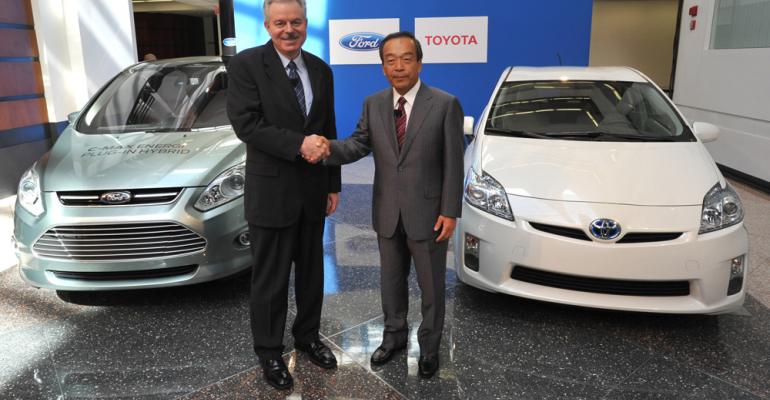DEARBORN, MI – The ultimate goal of a partnership formed last year between Ford and Toyota is a hybrid-electric fullsize pickup, says a high-ranking Ford engineer.
“The nut we’re trying to crack is how do we do an F-150 hybrid?” Kevin Layden, Ford director-electrification programs and engineering, tells WardsAuto at a media backgrounder here. “We’re working with (Toyota) and developing plans.”
The auto makers last year inked an agreement to jointly develop rear-wheel-drive hybrid-electric powertrains, noting increasing fuel efficiency of light-duty pickups and SUVs is imperative to remaining viable in a U.S. market facing increasingly stringent government emissions and mileage regulations.
The partners hope to mitigate costs and increase speed-to-market of new products.
Work with Toyota is ongoing, Layden says, but he declines to reveal when a production vehicle may result from the tie-up.
There are several obstacles confronting engineers, Layden says, including how to ensure a fuel-efficient electrified powertrain can handle the workload and durability demands of pickup and SUV buyers.
“Everyone wants to tow with a truck, and that’s a duty cycle that really taxes the battery and electric motor” he says. “We have to figure out how you maximize that and still get the fuel economy.”
Additionally, pickups and SUVs typically don’t have the aerodynamically efficient exterior designs hybrids require.
The auto makers are working on developing both electrified powertrains and vehicle platforms, Layden says, noting Ford’s philosophy is to design flexible electrified architectures rather than engineer one-off electrified vehicles.
He stops short of saying Toyota and Ford ultimately could share a pickup or SUV platform, but doesn’t rule out the possibility.
“I never say never about anything,” Layden says. “Our expertise is second to none, and Toyota has some excellent engineers as well. Putting them together and solving the issues associated with the greater weight of the truck and the greater power requirements are proving to be a benefit.”
Engineers are working together at a common site, though he declines to reveal the location. However, most soon will move to Ford’s recently established Advanced Electrification Center here.
The 285,000-sq.-ft. (26,477-sq.-m) facility already houses most of the 1,000 engineers working on Ford’s hybrid and electrification programs.
The auto maker says it is continuing to build on its electrified team, with 60 engineers hired in the past year and dozens more positions to be filled this year.
Bringing all its electrification engineers under one roof enhances communication between systems teams, Layden says.
The new center also has advanced battery-testing equipment that allows up to four battery chemistries to be tested simultaneously, double Ford’s capability of two years ago.
“Battery testing is exhaustive work; and the process is lengthy enough without having to find the right supplier with the right equipment,” he says. “Our goal is to deliver best in class, so there’s no time to waste.”





